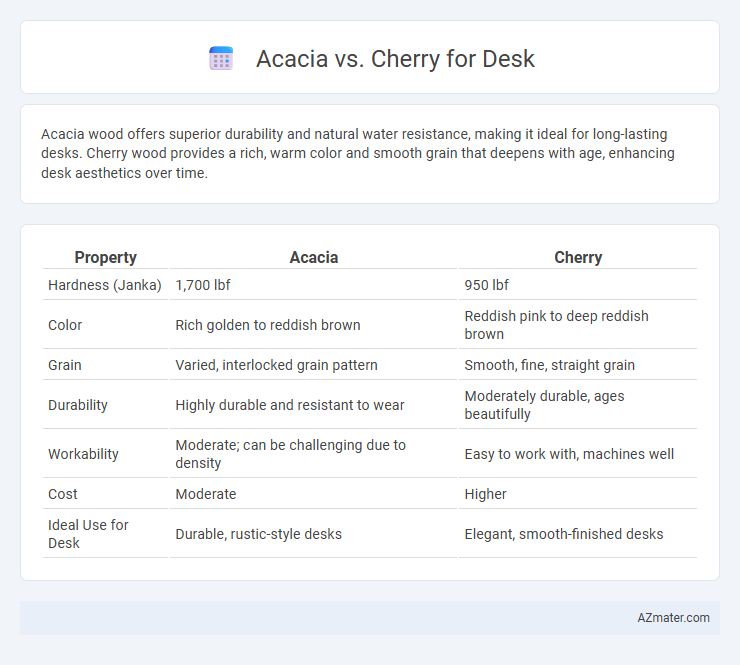Acacia wood offers superior durability and natural water resistance, making it ideal for long-lasting desks. Cherry wood provides a rich, warm color and smooth grain that deepens with age, enhancing desk aesthetics over time.
Table of Comparison
| Property | Acacia | Cherry |
|---|---|---|
| Hardness (Janka) | 1,700 lbf | 950 lbf |
| Color | Rich golden to reddish brown | Reddish pink to deep reddish brown |
| Grain | Varied, interlocked grain pattern | Smooth, fine, straight grain |
| Durability | Highly durable and resistant to wear | Moderately durable, ages beautifully |
| Workability | Moderate; can be challenging due to density | Easy to work with, machines well |
| Cost | Moderate | Higher |
| Ideal Use for Desk | Durable, rustic-style desks | Elegant, smooth-finished desks |
Introduction: Acacia vs Cherry Wood for Desks
Acacia and cherry wood are popular choices for desks due to their durability and aesthetic appeal. Acacia wood features a rich, varied grain pattern with natural resistance to scratches and moisture, making it ideal for high-use workspaces. Cherry wood offers a smooth, fine grain that deepens in color over time, bringing a warm, luxurious finish to elegant office furniture.
Overview of Acacia Wood
Acacia wood, known for its durability and rich grain patterns, offers a sturdy and visually appealing choice for desks. Its natural resistance to scratches and moisture makes it ideal for everyday use in home or office furniture. Compared to cherry wood, acacia tends to have a more rustic appearance with varied tones ranging from light amber to deep brown, enhancing the character of any workspace.
Overview of Cherry Wood
Cherry wood, prized for its rich reddish-brown hue and smooth grain, is a popular choice for desks due to its durability and elegant aging process that enhances its color over time. This hardwood offers excellent workability, making it ideal for fine craftsmanship and detailed desk designs. Compared to acacia, cherry wood generally has a softer texture but provides a warm, classic aesthetic that complements a variety of interior styles.
Appearance and Grain Comparison
Acacia wood features a rich, warm color palette with golden to reddish-brown hues and a highly distinctive, contrasting grain pattern that ranges from straight to wavy, creating a dynamic and eye-catching appearance. Cherry wood exhibits a smooth, fine grain with a uniform texture and a rich reddish-brown tone that deepens and darkens over time, offering a classic and elegant look. The bold, varied grain of Acacia creates a more rustic and natural vibe, while Cherry's consistent grain and color provide a refined, timeless aesthetic ideal for desks.
Durability and Hardness Differences
Acacia wood offers superior durability with a Janka hardness rating around 1,700, making it highly resistant to scratches and dents, ideal for heavy use desks. Cherry wood, rated at approximately 950 on the Janka scale, is softer and more prone to surface wear but ages beautifully with a rich patina over time. The choice between acacia and cherry desks depends on balancing the need for long-lasting hardness versus aesthetic evolution.
Cost and Affordability
Acacia wood desks generally offer a more affordable option compared to Cherry wood, making them suitable for budget-conscious buyers seeking durability and aesthetic appeal. Cherry wood desks tend to be more expensive due to their rich color, fine grain, and greater demand, often reflecting higher craftsmanship and luxury status. Cost differences typically arise from Acacia's faster growth and abundance versus Cherry's slower growth and scarcity, impacting overall affordability.
Sustainability and Environmental Impact
Acacia wood, known for its rapid growth and high density, offers a more sustainable choice compared to cherry, which matures slowly and requires longer harvesting cycles. Acacia's durability reduces the need for frequent replacements, minimizing resource consumption and waste over time. Cherry wood, though prized for its rich color and grain, often involves more intensive forestry practices that can impact biodiversity and carbon sequestration negatively.
Maintenance and Longevity
Acacia wood desks require less frequent sealing and resist scratches and dents due to their dense grain, making maintenance relatively easy compared to Cherry wood. Cherry wood, although softer and more prone to surface damage, develops a rich patina over time that enhances its aesthetic appeal but demands regular conditioning to prevent drying and cracking. Longevity favors Acacia desks in high-use environments as their durability withstands heavy wear, while Cherry desks are ideal for those prioritizing refined beauty with moderate care.
Suitability for Desk Construction
Acacia wood offers exceptional durability and resistance to wear, making it highly suitable for desk construction where long-term use is expected. Cherry wood provides a smooth texture and rich reddish-brown color, ideal for desks that emphasize aesthetic appeal and fine craftsmanship. Both woods are strong, but Acacia's hardness and moisture resistance make it better suited for heavy-use desks, while Cherry excels in creating elegant, refined workspaces.
Final Verdict: Choosing Between Acacia and Cherry for Your Desk
Acacia wood offers exceptional durability and rich, warm tones, making it an excellent choice for a sturdy, long-lasting desk with a unique grain pattern. Cherry wood provides a luxurious feel with its smooth texture and elegant reddish-brown color that deepens over time, ideal for a refined and classic desk appearance. Choosing between Acacia and Cherry largely depends on your preference for either robust, rustic charm or sophisticated, timeless elegance for your workspace.

Infographic: Acacia vs Cherry for Desk
 azmater.com
azmater.com